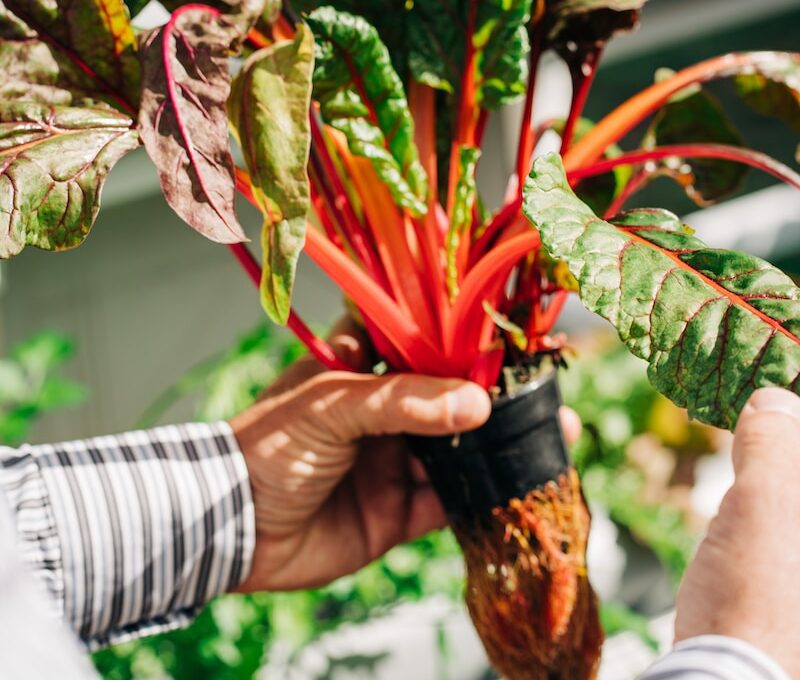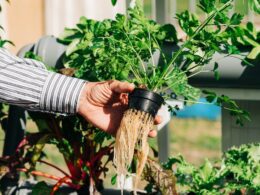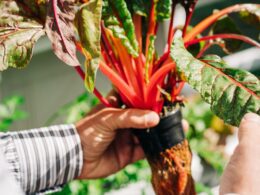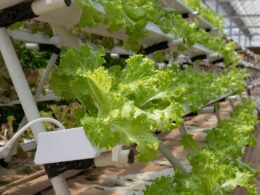If you’re considering getting into hydroponics, one of the most important factors to consider is the water solution you’ll be using. Water is the lifeblood of your hydroponic system, and choosing the right solution can make all the difference between a thriving garden and a mediocre one.
But with so many options on the market, it can be hard to know where to start. In this article, we’ll take a closer look at the different types of water solutions available for hydroponics, and help you determine which one is the best fit for your needs.
We’ll explore the benefits and drawbacks of each solution, as well as the factors you should consider when making your selection. Whether you’re a seasoned hydroponics pro or just starting out, this guide will help you make an informed decision about your water solution, ensuring that your plants get the best possible chance to grow strong and healthy.
Understanding the Importance of Water in Hydroponics
You’ll love learning about how crucial H2O is to the success of your hydroponic setup! Water quality is of utmost importance in hydroponics because it directly affects the plants’ growth and nutrient absorption.
Poor water quality can cause nutrient deficiencies, diseases, and even death to your plants. That’s why it’s essential to use only high-quality water that’s free from contaminants and has the right pH level.
The nutrient absorption process in hydroponics is different from traditional soil-based gardening. Instead of relying on soil to provide nutrients, plants in hydroponics get their nutrients from the water solution.
That’s why water quality is critical in hydroponic systems. The water solution must contain the right amount of nutrients and be at the right pH level for the plants to absorb them efficiently. If the water quality is poor, the plants won’t receive the nutrients they need, and their growth will be stunted.
Incorporating the best water solution for hydroponics is essential for the success of your plants. By ensuring that your water quality is excellent and contains the right amount of nutrients, you can provide your plants with the best environment to grow in.
Remember that your plants rely on you to provide them with the best possible growing conditions. With proper attention to water quality and nutrient absorption, you can have a thriving hydroponic garden that produces healthy and delicious produce.
Types of Water Solutions for Hydroponics
In hydroponics, you have the freedom to choose different types of fluid to feed your plants. The right water solution can significantly affect their growth and your yields. However, it’s not just about pouring tap water into your hydroponic system. You must consider the water quality and pH levels to ensure the best results.
Here are some types of water solutions you can use for hydroponics:
-
Tap Water: This is the most common water source for hydroponics. However, tap water has varying levels of dissolved minerals and impurities, which can affect the pH levels and nutrient uptake of your plants. You may need to treat your tap water to make it suitable for hydroponics.
-
Reverse Osmosis (RO) Water: This type of water undergoes a purification process that removes almost all dissolved solids, including minerals and impurities. RO water is ideal for hydroponics because it allows you to control the nutrient levels and pH more accurately.
-
Distilled Water: Like RO water, distilled water is pure and free from impurities. However, it lacks minerals that are essential for plant growth. You may need to add nutrients to your distilled water to make it suitable for hydroponics.
To ensure the success of your hydroponic garden, it’s crucial to use high-quality water. Always check the water quality and pH levels before using it in your system. Investing in a water testing kit is essential to make sure you’re giving your plants the best possible environment to thrive. Remember, healthy plants equal a bountiful harvest!
Factors to Consider When Choosing a Water Solution
When selecting what to feed your plants, there are several factors to consider, including the quality of the water you use and its impact on your yields. One of the most important factors is the pH balance of the water. Different plants require different levels of acidity or alkalinity, so it’s important to test your water and adjust the pH accordingly. If the pH is too high or too low, your plants won’t be able to absorb the nutrients they need, which can lead to stunted growth or even death.
Another important factor to consider is the nutrient concentration of the water solution. Depending on the type of plants you’re growing and the stage of growth they’re in, they may require different levels of nutrients. It’s important to follow a feeding schedule and monitor the nutrient levels in your water solution regularly to ensure your plants are getting the right amount of nutrients. Over-fertilizing can also be harmful to your plants, so it’s important to strike a balance between providing enough nutrients and avoiding nutrient burn.
To help you keep track of these factors, here’s a table outlining the ideal pH ranges and nutrient levels for different types of plants:
| Plant Type | Ideal pH Range | Ideal Nutrient Levels |
|---|---|---|
| Leafy Greens | 5.5 – 6.5 | High Nitrogen, Moderate Phosphorus, High Potassium |
| Fruiting Vegetables | 6.0 – 6.5 | Moderate Nitrogen, High Phosphorus, High Potassium |
| Herbs | 5.5 – 6.5 | High Nitrogen, Moderate Phosphorus, High Potassium |
| Flowers | 5.5 – 6.5 | Low Nitrogen, High Phosphorus, High Potassium |
| Root Vegetables | 6.0 – 6.5 | Low Nitrogen, High Phosphorus, High Potassium |
By paying attention to the pH balance and nutrient concentration of your water solution, you can ensure that your plants are getting the right amount of nutrients and growing to their full potential. Remember to test your water regularly and adjust the pH and nutrient levels as needed. With the right water solution, your hydroponic garden can thrive and provide you with bountiful harvests.
Pros and Cons of Different Water Solutions
If you’re trying to decide which type of water to use for your plants, it’s important to weigh the advantages and disadvantages of each option. Here are some pros and cons of different water solutions to help you make an informed decision.
-
Tap Water: Tap water is a convenient and affordable option for most hydroponic growers. However, it may contain impurities that can affect the pH balance and nutrient absorption of your plants. If you choose to use tap water, consider using a filter or letting the water sit for at least 24 hours to allow chlorine to dissipate.
-
Distilled Water: Distilled water is pure and free of contaminants, making it an excellent choice for hydroponics. However, it lacks the minerals and nutrients that plants need to thrive. If you choose to use distilled water, you’ll need to add nutrients to the solution to ensure your plants get the necessary minerals.
-
Reverse Osmosis Water: Reverse osmosis (RO) water is similar to distilled water in that it is pure and free of contaminants. However, it also lacks essential minerals and nutrients. Like distilled water, you’ll need to add nutrients to the solution if you choose to use RO water.
-
Rainwater: Rainwater is a natural and free water source that is rich in minerals and nutrients. However, it can be difficult to collect and store, and it may contain pollutants depending on your location. If you choose to use rainwater, make sure to filter it before use.
When choosing the best water solution for your hydroponics system, consider the pH balance and nutrient absorption of your plants. Remember to weigh the pros and cons of each option before making a decision. With the right water solution, your plants’ll thrive and produce a bountiful harvest.
Conclusion and Recommendations
You’ll be able to confidently choose the perfect water source for your thriving hydroponic oasis with these insightful pros and cons of different water options.
After weighing the benefits and drawbacks of tap water, well water, and reverse osmosis water, it’s time to make a decision.
If you’re on a tight budget, tap water may be the most cost-effective option. However, it may contain harmful chemicals and minerals that can harm your plants and your health.
Well water, on the other hand, may be a more natural and sustainable option. It’s also free of chlorine and other harmful chemicals. However, it can be expensive to install and maintain a well. Additionally, it may contain high levels of minerals that can clog your system and harm your plants over time.
Future developments in hydroponics may bring new water solutions that are even more effective and sustainable. Until then, it’s important to weigh the pros and cons of each option and make a decision based on your budget, location, and preferences.
Remember to consider the long-term costs and potential risks when making your choice. With the right water source, your hydroponic garden can thrive for years to come.
Frequently Asked Questions
Can I use tap water for hydroponics?
You may be wondering if tap water is safe to use for hydroponics. While it’s possible to use tap water, there are benefits to using filtered water in hydroponics.
Tap water can contain minerals and chemicals that can harm your plants, and these contaminants can build up over time. On the other hand, reverse osmosis water is highly purified and free of harmful contaminants, making it a great option for hydroponics.
When comparing tap water and reverse osmosis water in hydroponics, it’s clear that filtered water provides a safer and more consistent growing environment for your plants. By using filtered water, you can ensure that your hydroponic system is free of harmful contaminants and that your plants are getting the cleanest water possible.
How often should I change the water in my hydroponic system?
When it comes to hydroponics, ensuring optimal plant growth requires careful monitoring and adjusting of water quality and nutrient levels. This means regularly checking and adjusting pH levels and nutrient solutions to ensure they’re within the ideal range for your plants.
As for how often to change the water in your hydroponic system, it really depends on a variety of factors including the size of your system, the type of plants you’re growing, and the quality of your water source. However, a general rule of thumb is to change the water every two to three weeks.
By keeping a close eye on water quality and nutrient levels, you can ensure that your hydroponic plants thrive and produce a bountiful harvest.
Is it necessary to adjust the pH of the water for hydroponics?
To ensure successful hydroponic plant growth, it’s crucial to regulate the pH of your water. The importance of pH regulation in hydroponics can’t be overstated.
The pH level of your water affects the solubility of nutrients and minerals, which directly impacts plant growth. When the pH is too high or too low, plants are unable to absorb the nutrients they need, leading to stunted growth and even death.
Maintaining a pH between 5.5 and 6.5 is ideal for most hydroponic plants. Remember, the effect of pH on plant growth in hydroponics is significant, and adjusting the pH of your water regularly is essential for healthy and thriving plants.
Can I use rainwater for hydroponics?
Using rainwater for hydroponics is a great choice for several reasons. Rainwater is free of any chemicals and minerals that can be found in tap water, which makes it an ideal option for growing healthy and organic plants. Additionally, rainwater is naturally pH balanced and contains essential nutrients that can benefit your plants’ growth.
To collect rainwater, you can use a simple rain barrel or a more complex rainwater harvesting system. However, it’s important to note that rainwater can also contain pollutants and contaminants, so it’s recommended to test it before using it for your hydroponic system.
Overall, using rainwater for hydroponics can be a sustainable and cost-effective solution that can promote healthy plant growth.
How can I test the quality of the water in my hydroponic system?
To ensure the success of your hydroponic system, it’s crucial to test the quality of your water regularly. There are a few water quality testing methods you can use, including pH testing, total dissolved solids (TDS) testing, and electrical conductivity (EC) testing.
Maintaining proper water temperature is also essential in hydroponics, as it affects nutrient uptake and plant growth. You should aim to keep your water temperature between 65-75 degrees Fahrenheit.
By regularly testing and controlling the quality and temperature of your water, you can ensure a healthy and thriving hydroponic garden.
Conclusion
So, there you have it! You now have a better understanding of the importance of water in hydroponics, the types of water solutions available, and the factors to consider when choosing the best one for your needs.
Each solution has its own pros and cons, so it’s important to weigh them carefully before making a decision. In general, we recommend using a high-quality reverse osmosis water filter for your hydroponic system. While it may be more expensive upfront, it will provide you with the cleanest and most consistent water source for your plants, leading to healthier and more productive growth.
However, if you don’t have access to a reverse osmosis filter, don’t worry! There are other options available that can work just as well. Just remember to test your water regularly and adjust your nutrient solution as needed.
Happy growing!









